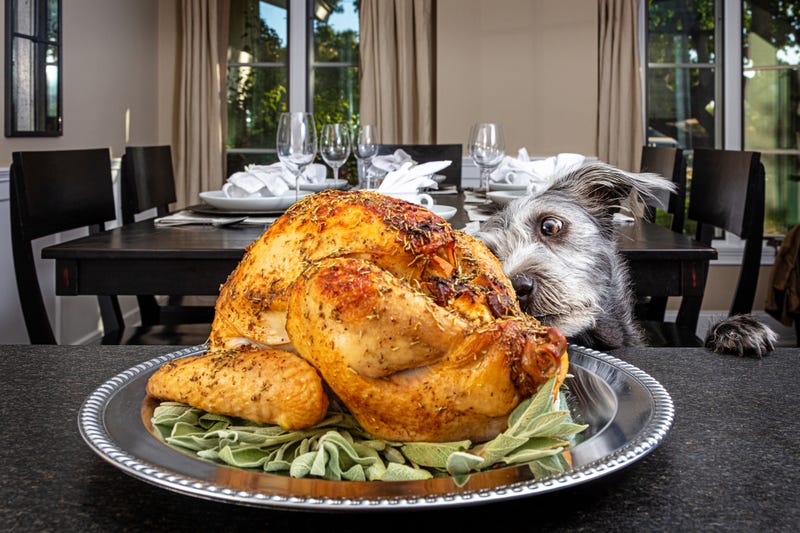
PHILADELPHIA (KYW Newsradio) — It’s a joyous time (well, usually) when family members get together for the holidays.
And while the turkey seethes on the table above, your lovable pooch is more than likely right by your side, savoring the scents of holiday seasonings.
Admit it — we’ve all snuck a piece of the bird to our pets under the table. Of course, they love it, but it’s important to remember the potential pet hazards that come with holiday get-togethers — including things you may think they’re allowed to eat.
Some of these may come off as common-sense reminders, but they are reminders nonetheless.

Trash and leftovers
If you’re like my family, there is a lot of food for the holidays — and then some.
Plain white meat is usually OK, but make sure your pet doesn’t get into any turkey carcasses, bones, strings or other garbage, according to Heart + Paw veterinary services, which is based in Berwyn.
You don’t want any jumpin’ Jack Russells hopping onto the counter either. Keep them clear of clutter, and make sure the trash can lid is closed tightly or outside on the curb.
Turkey no-nos
Speaking of things your pet shouldn’t eat: turkey skin. There are plenty of turkey-based pet foods on the market, but dogs shouldn’t have turkey skin or dark meat, says Heart + Paw.
Turkey skin is very high in fat, which makes it hard for some dogs to digest, even in small amounts.
Other foods that you’ll often cook with, like garlic or onions, are also toxic to dogs, so be mindful of the ingredients before giving a sample to your resident taste-tester.
Consider making your dog its own feast — it is the season of giving, after all. Chicken breast (sans skin and seasoning), sweet potatoes and carrots are all safe and healthy options.
Avoid chocolate, sweet desserts and other scraps, too.
Seasonal plants
Fall plants add a pop of color to the festivities, but some are extremely toxic if ingested by both cats and dogs.
Heart + Paw says the most common ones are autumn crocus, acorns that fall off of oak trees, and chrysanthemums, also known as mums.
If your pet got into these plants, contact your vet immediately.
When Christmas rolls around, the American Veterinary Medical Association (AVMA) says poinsettias, amaryllis, mistletoe, balsam, pine, cedar and holly also are dangerous and even poisonous. Check the ASPCA’s lists of toxic plants for dogs and cats.
Christmas trees aren’t toxic, but they can be hazardous. Make sure your tree — real or otherwise — is sturdy. AVMA says pets may try to climb them or play with the decorations, and that can tip the tree over. AVMA suggests tying your tree to the ceiling or a doorframe with fishing wire.
For real trees, be wary of water additives. Aspirin, sugar or other chemicals added to your tree’s base can be cause problems.
Social anxiety
As loveable and outgoing as some animals are, they can still get anxiety, just like us. Because of the coronavirus pandemic, not many of us have hosted or attended large gatherings in our homes, and your pet may have gotten used to that.
If you are inviting guests over this year and worried about how your pet may react, Heart + Paw suggests preparing a separate room with its bed and favorite toys, so they can snuggle up out of the way of all the excitement.
In more severe cases, talk to your vet about anxiety medication.
And, of course, microchip your pet if you haven’t already and update your contact information, in the event that it gets out of the house.
Shiny things!
Even we get wide-eyed and frenzied at the sight of twinkly lights, so imagine how your pet must feel. If your cat is likely to pounce on your Christmas tree (re: tree tippers) be mindful of the type of ornaments you hang. Animals can ingest broken pieces, which is clearly bad for a number of reasons.
Ornaments that are edible, like those crafted out of salt dough, should be kept out of reach as well. The same goes for open flames, including scented candles and Hanukkah menorahs.
AVMA says electric lights can cause burns if a pet chews through the cords, and tinsel or other decorations are also tempting. Consider creating a barrier around them.
Gift-giving is right around the corner too, and cats will have a field day with wrapping paper. While wrapping presents, do it on a table instead of the floor, Chewy suggests, and be careful not to drop things like strings or ribbons.
And, once opened on the big day, keep an eye on your pet and dispose of paper piles promptly.
Don’t worry, though. The ASPCA says any glitter accidentally licked up from the debris of presents is fine — though it may result in some very spirited and seasonal feces.
Just in case, you can always call the ASPCA Animal Poison Control Center at 888-426-4435.
No one wants to end up in the emergency room on Thanksgiving, Christmas or otherwise. It’s always a good idea to keep the contact information of the nearest 24/7 clinic handy, in case of emergency, as well as your vet hospital and its hours.
LISTEN on the Audacy App
Sign up and follow Audacy
Facebook | Twitter | Instagram



